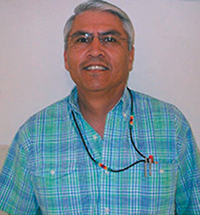 Why did you choose your specific health professional career?
Why did you choose your specific health professional career?
When I graduated with an electronic engineering degree, a lot of my graduating classmates were getting jobs with major industrial corporations that have large contracts with the government and the military to build missiles and things of that sort. I didn’t feel that I needed to do that. I wanted my career to be of positive things. I found out that the health care industry had a profession in the biomedical engineering field; that’s why I chose to go into health care.
What experiences did you have to make sure this profession was right for you?
To get into this profession, I had to start at the very basic ground level, meaning that even though I had an engineering degree, I had to start as a technician and progress from level one through three. Then as an introductory engineer, I progressively advanced from level one, to two, and then three. The engineering was more of a challenge. The job/training at that time was in a private sector hospital. I was given more responsibility over certain departments as I gained more experience. I gained more responsibility in the health care field through the operating room. This involved general surgery, cardiovascular surgery, neurological surgery and other sensitive types of surgery processors that relate to medical equipment.
Describe any obstacles or barriers to success that you encountered along your health professional career path and how did you overcome them?
An obstacle for me was at the level of status co-technician. I knew I wanted to stay in the field because I like a variety of challenges of all kinds. I guess some people enjoy trouble shooting, or repetitious work but I didn’t. I think that the technician field was probably the biggest obstacle that I had to overcome. As I worked towards my professional goal, I had to be flexible and to gain more experience. This includes changing jobs as well as receiving promotions to get to where I am today. To work as a Biomedical Engineer, I’ve been promoted several times. To develop a Healthcare career, folks need to be flexible by way of changing job locations for promotions.
What do you do in your current job?
I work with Indian Health Service, Phoenix Indian Medical Center (PIMC) and Phoenix Area Office. Within PIMC, I manage the biomedical engineering department, which maintains all of the medical equipment, the surgical eye equipment, and the O.B.I. (On Board Imaging) equipment. Those are the more complex systems, and then of course the majority of the equipment is becoming a computer based network system, which is changing the biomed engineering field. Now I have to be knowledgeable in the field of medical equipment and the field of information technology. In addition, I do the consulting for several different hospitals and clinics within Arizona, Nevada, and Utah. This means that I travel to these locations and advised them about different equipment, how to get the equipment, and how to purchase it. If they are seriously interested, then I look at all the specs, including bringing medical equipment vendors in for a demonstration. Lastly, I look at their finances to make sure they have an adequate amount of money and I look at their current equipment to make sure it meets the standards found in codes and regulations.
What advice do you have for American Indian/Alaska Native students who are interested in health careers?
It’s difficult at times for young people to find a job especially if they do not have any experience. I applied for a lot of jobs and was rejected. I eventually proceeded to find a job in the private sector. My advice for students who are fresh out of college is not to give up and if you can find work in private sector first. You will be exposed to more in regards to advanced technology. You’ll shine when you get into government healthcare.

